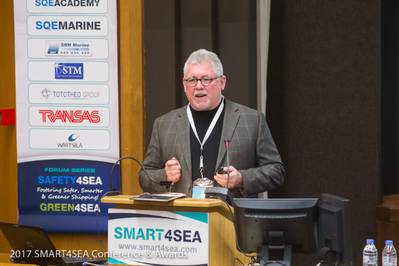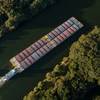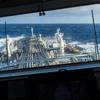Transas CEO Frank Coles delivered a presentation at 2017 SMART4SEA Conference & Awards, where he voiced his views on “smart shipping”, from big data and cyber security to unmanned ships.
We live in a world where we hear the words, smart ships, connected ships, unmanned ships, automated ships, etc. We hear statements about a digital shipping world and a forecast of new business models in shipping. It’s a confusing world, a fast moving world. What is the reality and how do we sift through the hype?
Shipping has many elements: logistics, cargo booking and trading, port control, chartering, container management, etc. I think it is important to not generalize about the ecosystem and simply say shipping when considering the impacts of digitalization. Everyone can be a visionary or futurists if they simply say shipping is going to be digital. Many parts of shipping are already digital, many sections of shipping is digital and many parts are already going there. These are largely the parts connected to cargo handling, logistics, the parts connected to the shore and the associated business ashore. They matter more in the financial equation, they are much larger and more important in terms of scale.
The part we all call shipping, ship owning and technical operations is really the asset ownership, the asset management and is a small niche in the whole picture. We have elements in this that are going digital – like charts, like navigation, training – but it is not happening anywhere near as fast as the more lucrative logistics side of the shipping business. It will come, but we still debate the why and how. Maybe because crews are still cheap enough, maybe because there are actually on 40,000 SOLAS ships that carry the world trade, which is relatively small in scale compared to the number of containers, the value of the cargo, etc. Maybe we just have not provided the right model for the ship owners and operators yet.
Before we can really consider an unmanned ship we need to resolve several key elements of the business of ship operations. We need a workable ecosystem, we need connectivity and we need acceptable cyber security. It is my proposition that none of these exist today.
In my view our ecosystem is dysfunctional, the link between ship and shore currently adds pressure to the ship and crew, it does not add value. Traffic control and communications to other elements of the ships operations has no standards. There are some attempts to introduce some ideas with things like STM and Mona Lisa. The weakness in them is the attempt to try and tie in too many stakeholders not attached to ship operations. As I have already said we need to be focused in order to get change. We should consider the manner in which the airline ecosystem works. A properly controlled ATC, a well established plane to operator communications system and also growing connectivity between the machinery and the manufacturers. They are not drone planes but properly established automation and protocols to operate safely. Even if the plane was a drone, it would still need to share the air space. Do we honestly think countries would allow unmanned and uncontrolled aircraft and ships to pass through their air space or territorial waters?
Connectivity is critical to a successful automated or unmanned ship, and we are nowhere near the required level of capability for this to occur. While there is increased capacity and a growing price competition in the satellite communications market it is not at the levels it needs to be for the general shipping industry. Maritime communications need to be given the same pricing as the aviation industry. This will enable the industry to embrace the connected ship into a smart ship. But, this alone is not going to create an unmanned or more remotely operated ship. There are other issues associated with getting to that point, like complexity of the install, confusing choices in installation and the requirement for a cyber secure and robust connection.
In effect we need the reliability of the Fleet broadband equipment and system with the bandwidth of an always on pipe that is cost effective for remote maritime operations. There remains however the final question of cyber security.
Cyber security is nothing more than smart IT procedures and process using certified equipment. If you install an ECDIS or a GMDSS unit, or a radar or indeed any other required and designated piece of bridge equipment, it needs to be certified by Class and pass through a large and significant list of regulations. Today’s modern ship to shore communications used for operations and being touted for unmanned ships contains no such regulations and as such is the weak link in the chain. This is like allowing the office network operate without any controls over what is installed or used on the computers.
The GMDSS network installation is highly regulated, the VSAT networks are not. Neither Fleet Broadband or Iridium systems have any certification program, tied to the various regulatory bodies. So while the ECDIS or the other bridge sensors have sophisticated protection, the bent pipe connection to the shore remains exposed on many levels. The hardware, the antenna, the teleport, the modem on board. With the plethora of systems and configurations available the weakness is multiplied. While many may not like a closed system like Inmarsat, maybe it is the best option for securing and setting the standards for connectivity for security. Without it we will likely not see a safe unmanned ship.
A final word on cyber security, and some salient points. The human is the biggest danger, the more access we give them, the higher the risk. Then there is the cyber missile, the thumb drive, able to destroy an ECDIS or any system in seconds. Last by no means least, AIS, the system by which many seem to be building digital solutions, using the AIS positional data. This is, in my opinion a high risk strategy. Attack Infiltrate Spoof is a better way to think of AIS.
If shipping, or rather asset management is going to be digitized, it needs a revolution. London Black Cabs did not invent Uber, and Hilton did not invent AirBnB. So is it really possible that the current players will invent unmanned ships, ship traffic control or even create a new eco system paradigm. If we are going to see a new model, with possibly ships owned by large financial institutions, managed by huge operations centers, driven by a remote Master, and routing controlled through ship traffic decision support centers…. It may need new technologies, new communications and new people.
Frank Coles recently shared with Maritime Reporter TV his views on big data and the maritime industry's attitude toward the uptake of new technologies. View the interview here.














